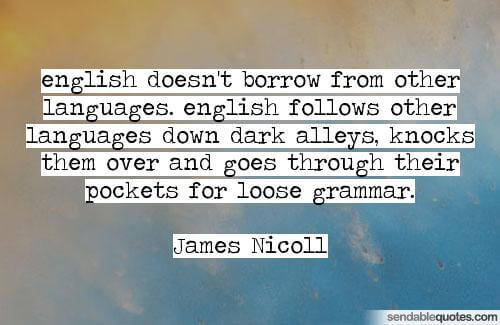Abbreviations, Acronyms and Initialisms in English
Abbreviations, Acronyms and Initialisms in English We have a lot of acronyms, abbreviations and initialisms in English, which we assume most people...
Flexible group courses for everyday communication and fluency.
Academic EnglishPrepare for university study with advanced academic language skills.
Business EnglishEnglish for professional communication in corporate and workplace settings.
Private LessonsOne-to-one lessons tailored to your goals, schedule and interests.
Language ExcursionsLearn English while exploring Cape Town with your teacher as your guide.
Get the score you need with targeted strategies and expert support.
Cambridge ExamsPrepare for the FCE or CAE with structured, high-quality training.
TOEFL PreparationBuild confidence and test skills to succeed in the TOEFL exam.
Personalised one-to-one English lessons delivered online, on your schedule.
Corporate GroupsLive online training for teams, customised to your organisation’s needs.
English for Tech ProfessionalsSelf-paced English course designed for developers, engineers, and IT teams.
Qualify to teach English in South Africa or abroad with this practical course.
Blended Certificate in TEFLCombine online study with hands-on classroom experience in Cape Town.
Learn in a historic university campus right in the city centre.
Tours and ActivitiesExplore Cape Town and make friends through weekly excursions.
Social ProgrammeJoin our schedule of fun events, outings and conversations.
Getting AroundTips and tools for navigating the city like a local.
Social and DigitalStay connected online and through our vibrant student community.
A friendly, sociable student house just a short walk from school.
Adderley StudiosModern, secure apartments in the heart of Cape Town.
HomestayLive with a local family and experience South African culture.
Hotels & AparthotelsIndependent options for comfort, privacy and flexibility.
All tuition and accommodation fees in one clear table.
Booking InformationWhat to expect before, during and after you book.
Instalment PlansFlexible payment options for long-term bookings.
User LoginView your bookings, make payments, and manage your details.
Visa options and support for international students coming to South Africa.
Insurance & TravelWhat you need to know about travel, insurance and staying safe.
MyELC AppAccess your timetable, progress and more on the student app.
Arrival and OrientationHow we help you settle in on your first day in Cape Town.
How to request certificates, transcripts, or proof of enrolment.
Terms & ConditionsThe small print — bookings, cancellations, and more.
Contact UsGet in touch with the ELC team by email, phone or WhatsApp.
Privacy PolicyHow we protect your data and respect your privacy.
What makes ELC and UCT a great place to learn English.
About the University of Cape TownSouth Africa’s leading university and home to the ELC.
About the English Language CentreWho we are, what we offer, and how we teach.
Our TeamMeet the teachers, support staff and leadership team behind ELC.
Our international quality standards and endorsements.
Media & PressNews coverage, interviews and media mentions of ELC.
TestimonialsWhat our students, partners and teachers say about us.
BlogUpdates, stories and insights from the ELC community.
Flexible group courses for everyday communication and fluency.
Prepare for university study with advanced academic language skills.
English for professional communication in corporate and workplace settings.
One-to-one lessons tailored to your goals, schedule and interests.
Learn English while exploring Cape Town with your teacher as your guide.
Get the score you need with targeted strategies and expert support.
Prepare for the FCE or CAE with structured, high-quality training.
Build confidence and test skills to succeed in the TOEFL exam.
Personalised one-to-one English lessons delivered online, on your schedule.
Live online training for teams, customised to your organisation’s needs.
English for Tech Professionals
Self-paced English course designed for developers, engineers, and IT teams.
Qualify to teach English in South Africa or abroad with this practical course.
Combine online study with hands-on classroom experience in Cape Town.
Learn in a historic university campus right in the city centre.
Explore Cape Town and make friends through weekly excursions.
Join our schedule of fun events, outings and conversations.
Tips and tools for navigating the city like a local.
Stay connected online and through our vibrant student community.
A friendly, sociable student house just a short walk from school.
Modern, secure apartments in the heart of Cape Town.
Live with a local family and experience South African culture.
Independent options for comfort, privacy and flexibility.
Use our Course Wizard to match your goals and level to the best option
Course WizardAll tuition and accommodation fees in one clear table.
What to expect before, during and after you book.
Flexible payment options for long-term bookings.
View your bookings, make payments, and manage your details.
Visa options and support for international students coming to South Africa.
What you need to know about travel, insurance and staying safe.
Access your timetable, progress and more on the student app.
How we help you settle in on your first day in Cape Town.
How to request certificates, transcripts, or proof of enrolment.
The small print — bookings, cancellations, and more.
Get in touch with the ELC team by email, phone or WhatsApp.
How we protect your data and respect your privacy.
What makes ELC and UCT a great place to learn English.
About the University of Cape Town
South Africa’s leading university and home to the ELC.
About the English Language Centre
Who we are, what we offer, and how we teach.
Meet the teachers, support staff and leadership team behind ELC.
Our international quality standards and endorsements.
News coverage, interviews and media mentions of ELC.
What our students, partners and teachers say about us.
Updates, stories and insights from the ELC community.
1 min read
Simon Harrison
Updated on July 6, 2025

Table of Contents
Modern English words, as we know them, have an interesting background. So where do so many of the foreign words in English actually come from?
The English language has a long history of borrowing words from other languages. These “borrowings” can usually be traced back to specific periods in history. It is estimated that the origins of modern English can be broken down as follows:
|
Latin |
29% |
|
French (includes Anglo-French) |
29% |
|
Germanic Languages (Old/Middle English, Old Norse, Dutch) |
26% |
|
Greek |
6% |
|
Other languages/ unknown |
6% |
|
Derived from Proper Names |
4% |
See the chart here: https://en.wikipedia.org/wiki/File:Origins_of_English_PieChart.svg
It may surprise you that some of our most common words are borrowed.
They/their – This common pronoun comes from the Old Norse word “Peir”.
Person – This comes from the Latin “persona”. It was adopted by the French language and then eventually made its way into English.
Very – This despised yet commonly used adjective comes from the Old French “verai”, which means “true”.
Dollar – This comes from Czech through Dutch. Its roots are connected to the origins of the mint itself: a factory where coins and currency is produced.
War – This comes from the Old French “werre”.
Leg and Skin – Both words come from Old Norse and replaced “shank” and “hide” upon their arrival. Although the words still exist in English, they are used only for animals once slaughtered.
Slaughter – This comes from the Old Norse “slatr”.
Skipper – This comes from the Dutch “schipper”. Many of our nautical terms are derived from Dutch due to the trade links that existed.
Court – In French this means the king’s residence and was often the place to which someone was called in order to respond to accusations.
Zero – This comes from Arabic. In fact, many of our words related to numeracy, mathematics and trade can be traced back to Arabic.
So extensive is English’s borrowing habit that it prompted this rephrasing of an earlier quote by James Nicoll:
“English doesn’t borrow from other languages. English follows other languages down dark alleys, knocks them over and goes through their pockets for loose grammar.” James D. Nicoll
Check out our English Courses
Abbreviations, Acronyms and Initialisms in English We have a lot of acronyms, abbreviations and initialisms in English, which we assume most people...

English Words – How Many is Enough? When it comes to language, one can never have too many words. According to BNC (British National Corpus), the...

Learning English with ChatGPT Love it or hate it, AI is here to stay. A lot of folks are talking about ChatGPT and if you haven’t been living under...